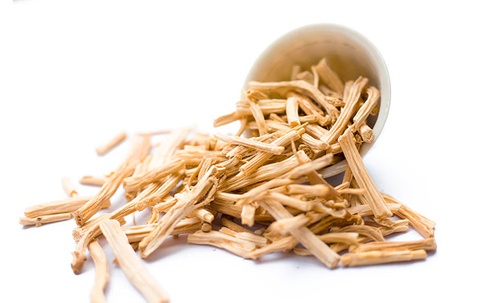Shatavari is an adaptogenic herb that helps the body cope with physical and mental stress and improves overall health.
The word Shatavari comes from the Sanskrit word which can be translated as ‘women who possess 100 spouses’ implying its ability to increase female fertility and vitality. The other interpretation of the word is ‘shat’ which implies 100 and ‘avara’ which means lower and can be said to be a plant that possesses 100 roots.

Botanical name: Asparagus racemosus wild
Family: Liliacea
a. Hindi; shatavare
b. English; climbing asparagus, wild asparagus, buttermilk root
c. Kannada; halavu makkala thayi beru, majjige gadde, ugurele gida
d. Tamil; sadavare, thanneer vittan kizangu
e. Marathi and gujarathi; sataveri
f. Gujarathi; shatavei
g. Malayalam; shatavari
h. Assam; satamul
i. Bengali; shatamuli, dogri, sainsarbil
Shatavari's diverse vernacular names reflect its cultural significance across regions, from Hindi's "shatavare" to Tamil's "sadavare." Ayurvedic Insights: The Ayurvedic text Bhavaprakasha Nighantu describes Shatavari as a cooling, sweet, and bitter herb that pacifies Vata and Pitta dosha.
The Ayurvedic text Bhavaprakasha Nighantu describes Shatavari as a cooling, sweet, and bitter herb that pacifies Vata and Pitta dosha.
शतावरी गुरुः शीता तिक्तस्वाद्वीरसायनी |
मेधाग्निपुष्टिदास्निग्धानेथ्र्यागुल्मातिसारजित.|
शुक्रास्तन्यकरीबल्यावातपित्तास्र्शोथजित ||159||
भावप्रकाशनिघन्टु
a. Rasa (taste); Madhura (sweet), thiktha (bitter)
b. Guna (quality); guru (heaviness), sheeta (cold) and snigdha (oily, unctuous)
c. Veerya (potency); sheetha (cold)
d. Vipaka (conversion after digestion); Madhura (sweet)
e. Effect on tridosha; pacifiesvata and pitta
Ayurvedic references highlight Shatavari's multifaceted benefits, from being an anti-ageing Rasayana to improving intelligence and digestive strength.
a. Rasayana; antiaging
b. Medhya; improves intelligence
c. Agni pushtda; improves digestive strength
d. Nethrya; improves vision/useful in eye disorders
e. Gulma; useful in treating abdominal lumps
f. Atisarajith; useful in treating loose motion
g. Shukrakaari; improves the quality and quantity of sperm and semen
h. Sthyanyakaari; improves lactation in lactating women
i. Balya; improves body strength
j. Vata pittajith; pacifies vitiated vata and pitta dosha
k. Asrijith; reduces excess bleeding
l. Shothajith; reduces oedema/ swelling
Shatavari enhances breastmilk secretion during lactation, providing nutritive value and boosting the immune system of the breastfed baby.
Shatavari treats both male and female infertility, supporting hormonal balance and acting as a primary uterine tonic. Its steroidal saponins regulate estrogen, managing menstrual cycles and alleviating PMS symptoms.
As an anti-ageing Rasayana herb, Shatavari prevents free radical cell damage. A 2004 study identified a new antioxidant called racemofuran within Shatavari root, alongside known antioxidants like asparagine A and racemose.
Shatavari nurtures the stomach's mucous membrane, exhibiting cytoprotective activity. It prolongs the lifespan of mucosal cells, increases mucous secretion, and reduces H+ ion back diffusion, effectively healing duodenal ulcers.
Shatavari, a rejuvenating Ayurvedic herb, cools and strengthens the body while nourishing the tissues.
Useful for managing anxiety symptoms, Shatavari balances vitiated pitta and vata dosha, providing a calming effect on the nervous system and promoting sound sleep.
Shatavari, the 'Queen of Herbs,' unveils a world of holistic wellness through its adaptogenic qualities. From fertility support to anti-aging properties, Shatavari seamlessly integrates ancient wisdom with modern well-being. Embrace the time-tested benefits of Shatavari and embark on a journey towards comprehensive health and vitality.
Comments
There are currently no comments
New Comment